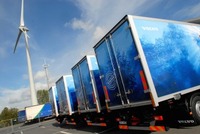Volvo Trucks seek rapid reduction in carbon dioxide emissions
 Through Volvo Logistics, Volvo Trucks is challenging its transporters to reduce carbon dioxide emissions by 20 per cent within the next two years.
Through Volvo Logistics, Volvo Trucks is challenging its transporters to reduce carbon dioxide emissions by 20 per cent within the next two years. This challenge is yet another element in Volvo Trucks’ climate strategy which, amongst other things, already aims at carbon-neutral production, energy efficiency, alternative fuel technology and recycling.
“I want the transporters who deliver goods to and from our main factories in Europe to reduce their carbon dioxide emissions by 20 per cent by 2010. This is part of our climate strategy,” says Volvo Trucks’ President and CEO, Staffan Jufors. “Our emissions can be rapidly reduced through a number of measures, such as reduced fuel consumption, more efficient logistics, the use of biofuels and the replacement of old vehicles.”
Volvo Trucks already offers a number of products and services under the umbrella concept, ‘Fuelwatch’, whose purpose is to reduce fuel consumption and, as a consequence, improve the environmental impact of Volvo Trucks’ customers.
Volvo Logistics is working together with transporters
Volvo Logistics, which is responsible for Volvo Trucks’ transports, will develop a set of concrete measures together with its suppliers. Then, in conjunction with the ‘Logistics & Transport’ exhibition which takes place from May 20th to 22nd 2008, in Gothenburg, Sweden; it will present its action plan for the reduction of carbon dioxide.
“We are prepared to take on the tough challenge that a 20 per cent reduction in carbon dioxide emissions by 2010 implies,” says Åke Niklasson, President of Volvo Logistics
Halved climate impact a common goal
Volvo Trucks announced its challenge in conjunction with the seminar, ‘Klimatneutrala godstransporter på väg’ (On the Road to Climate Neutral Freight Transportation). The seminar was organised together with Schenker, the Nordic logistics company, Preem, the Swedish petroleum corporation, the Swedish Road Administration and Chalmers University of Technology, with participation from Åsa Torstensson, Minister of Infrastructure. These participants have a common goal – to halve the climate impact of goods transports by 2020 compared with 2005. In the long run, the aim is to make goods transports by road entirely carbon dioxide-neutral.

